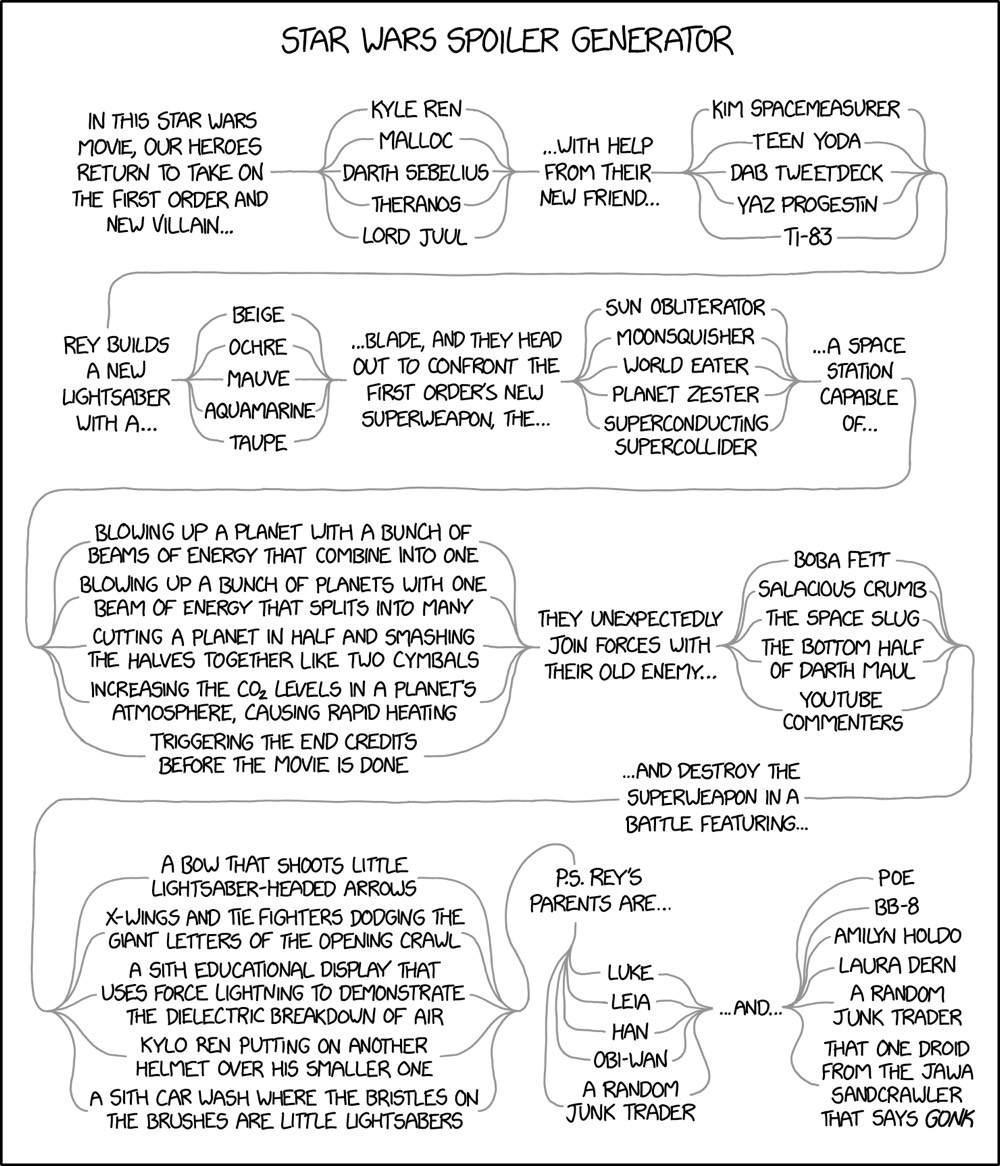He was a blogger who you heard about before you saw him ...
The master gave his teaching in parables and stories, which his disciples listened to with pleasure – and occasional frustration, for they longed for something deeper.
The master was unmoved. To all their objections he would say, “You have yet to understand that the shortest distance between a human being and Truth is a story.”
What is the future of the Star Wars universe
We know from the Rise of Skywalker that the Emperor is dealing in some prettyoff-the-grid science. And in the Legends content he dabbles in all sorts of dark, strange magics connected to the dark side of the Force.
There's absolutely a chance the Emperor built his son with a combination of science and dark side shenanigans.
Strange as at Dendy cinemas most viewers ennjoyed the latest and final version ... You cannot please every critic ... Rise of Skywalker Is Superficial Satisfaction for Star Wars Fans
So How Exactly Did They Get Carrie Fisher, Who Died In 2016, Into The New Star Wars Movie?

The movie was supposed to be about her, or be “her movie,” according toThe Rise of Skywalkerdirector J.J. Abrams. But she died long before this one started shooting. The way it worked was a reminder to everyone, writers and photographers and videographers, to save edited scenes. “‘Originally the frustration I felt at cutting out these scenes that we had shot in ‘Force Awakens,’’ Abrams says, ‘were suddenly the relief that we needed in prepping ‘The Rise of Skywalker.’'” –Washington Post
MacGuffins! That said, contrary to many reviews, the plot made perfect sense to me, many scenes were excellent, and the whole thing had a sweep and grandeur that episodes seven and eight completely lacked. It had many of the strengths and flaws (and plot devices) of Return of the Jedi, but after forty-two years of waiting for the series to conclude mostly I went away happy. Believe it or not.
Source | Anthony de Mello, One Minute Wisdom,(Doubleday, 1986) page. 23
Politically correct takes on The Rise of Skywalker (full of spoilers)
MANAGE YOUR MONEY, YOU MUST: 10 Money Lessons We Learned from Star Wars
Star Wars - in a nutshell - we really enjoyed it too ... too many people wanting a revolution rather than evolution... the latter is what the fan base want and got .. the former is what the critics want
~ courtesy of outlawish boxer Ruby

PONDER AND CONSIDER
The shortest distance between a human being and Truth is a story
~ courtesy of outlawish boxer Ruby
From Randall Munroe at XKCD, here’s a spoilers generator for the latest Star Wars movie.

In this Star Wars movie, our heroes return to take on the First Order and new villain Theranos with some help with their new friend Dab Tweetdeck. Rey builds a new lightsaber with a beige blade, and they head out to confront the First Order’s new superweapon, the Moonsquisher, a space station capable of cutting a planet in half and smashing the halves together like two cymbals. They unexpectedly join forces with their old enemy Boba Fett and destroy the superweapon in a battle featuring Kylo Ren putting on another helmet over his smaller one. P.S. Rey’s parents are Obi-wan and Laura Dern.
PONDER AND CONSIDER
The shortest distance between a human being and Truth is a story
Vladimir Putin’s annual news conference President of Russia. JTM:
Tom Spurgeon Birthday Memorial Episode – The Virtual Memories Show.Maybe not supposed to link in anything from kremlin.ru, but read through this press conference by that Putin guy and ask whether any, and I mean any, of the people who rule us via the still slightly velvet glove have a snippet of the gravitas and understanding of this guy. Or Lavrov. “Our” rulers are taking us down with their sinking capital ship…”
“The thing about Tom was, he wasn’t necessarily interested in everything you were interested in, but he was interested in learning about WHY you were interested in it. That sort of curiosity is rare, and it’s part of what made him a special person.”
She looked out the porthole: the sea was an inky navy blue, and the boat was softly creaking from side to side. How incredibly different the sea was when you were at the beach swimming in it than when you were aboard a ship looking down at it, hard and impenetrable as a marble tabletop streaked with green.
Stories that speak of the wounds of poverty and racism and of the world of crime and heartbreak. Ultimately the novel is about what both bonds and separates us from our friends, families, and homes. Written in gritty and evocative language, … resonates with a raw energy that sings off the page.

Calling someone an ape is bullying. Talking about ‘boning’ employees is bullying. Suggesting people should have their heads held underwaterbecause they rub you the wrong way is bullying.
The mystery of language …
You fight your superficiality, your shallowness, so as to try to came at people without unreal expectations, without an overload of bias or hope or arrogance, as untanklike as you can be, sans cannon and machine guns and steel plating half a foot thick: you come at them unmenacingly on your own ten toes instead of tearing up the turf with your caterpillar treads, take them on with an open mind, as equals, man to man, as we used to say and yet you never fail to get them wrong. You might as well have the brain of a tank. You get them wrong before you meet them: you get them wrong while you’re with them and then you get home to tell somebody else about the meeting and you get them all wrong again. Since the same generally goes for them with you, the whole thing is really a dazzling illusion empty of all perception, an astonishing farce of misperception. And yet what are we to do about this terribly significant business of other people, which gets bled of the significance we think it has and takes on a significance that is ludicrous, so ill equipped are we all to envision one another’s interior workings and invisible aims? Is everyone to go off and lock the door and sit secluded like the lonely writers do, in a soundproof cell, summoning people out of words and then proposing that these word people are closer to the real thing than the real people that we mangle with our ignorance every day? The fact remains that getting people right is not what living id all about anyway. It’s getting them wrong that is living, getting them wrong and wrong and wrong and then, on careful reconsideration, getting them wrong again. That’s how we know we are alive: we’re wrong. Maybe the best thing would be to forget being right or wrong about people and just go along for the ride. But if you can do that—well, lucky you.

10 most famous paintings in the world
The other strange thing about language is that while it gives things an initial identity, it also obscures that identity over time. When Helen Keller learned the word for “water” in the example above she became aware of a distinctness the stuff hadn’t possessed for her until that moment (not that it was without any distinctness before). The problem is that the repeated use of the word swallows the thingness of water so that it is nearly lost. Language, Percy writes, “operates not only as a means of knowing but also as a means of concealment.” Objects can become “encrusted by a symbolic simulacrum”—a simulacrum that can only be broken (temporarily) by accident or art.
Nabokov enjoyed knockout punches — both in boxing, where he took them, and in criticism, where he landed them... Nobokov
At What Point Does Memoir Become Biography And Biography Become History?
“[Biography] was once thought, as Michael Holroyd called it, ‘the shallow end of history’, unable to provide sufficient context and with a tendency to exaggerate the role of individuals in the passage of time. … Many a biographer still falls in love with his or her subject, making the hope of objectivity even dimmer than for conventional history. And arguably the whole conceit is flawed.” – History Today
“It is better to be a human being dissatisfied than a pig satisfied; better to be Socrates dissatisfied than a fool satisfied.” So wrote John Stuart Mill in his 1861 treatise Utilitarianism. And most of us are inclined to agree with him. But why? What great thing do humans have that pigs lack? Whatever it is, it had better be something good if it is to compensate us for missing out on the pig’s felicity.
What differentiates people from pigs? Perhaps just the existence of autobiographical memories, from which we construct a self
What differentiates people from pigs? Perhaps just the existence of autobiographical memories, from which we construct a self
I haven't seen any discussion of the extent to which this year's Nobel Prize in Literature announcements have had an effect on sales of books by laureates Olga Tokarczuk and Peter Handke, but at Deutsche Welle Sabine Peschel offers a look at How the Nobel Prize affects book sales, mainly in the German-speaking world.
Interesting, for example, that:
The publisher mentions the case of Egyptian author Naguib Mahfouz, who was unexpectedly named the winner in 1988: "Nobody knew him, or even how to spell his name right. We had sold 300 copies in three years — and then 30,000 in three minutes."(In German they write his name: 'Nagib Machfus' .....)
As to this year's prizes: Handke has always been a big seller in German, but: "In the seven weeks following the announcement of the Nobel Prize, Suhrkamp sold 150,000 copies of Handke's books, according to press spokesperson Tanja Postpischil".
As to Tokarczuk:
Her 1,200-page opus magnum, The Books of Jacob, was published in German 10 days before she was awarded a Nobel Prize. Before the announcement, Kampa had sold about 1,200 copies. After that, the 3,000 copies of the available print run were sold out in no time.
The Sydney Morning Herald asked: "writers from here and overseas to tell us about their favourite reads this year", and collect them in The books we loved in 2019.
At the Center for the Art of Translation blog Chad Felix has Indie Booksellers Share Their Favorite Translations of the Decade -- twenty-three works of literature in translation.
Lots of great titles here -- and several that are obvious choices, including Anniversaries and Zibaldone, but John E. Woods' translation of Arno Schmidt's Bottom's Dream only gets an incidental mention ("which I'd venture to say is more admired than read") ? Slightly disappointing too: only one title not translated from a European language (and French and Spanish ... very well represented).
This year, the World Bank told current and prospective employees of Taiwanese nationality they must present Chinese travel documents in order to maintain or pursue employment.
Here is more. You will note “Taiwanese law prohibits citizens from maintaining dual citizenship with China.” However upon responding to an inquiry from Axios, the World Bank senior leadership seems to have walked back this policy (for now?).
